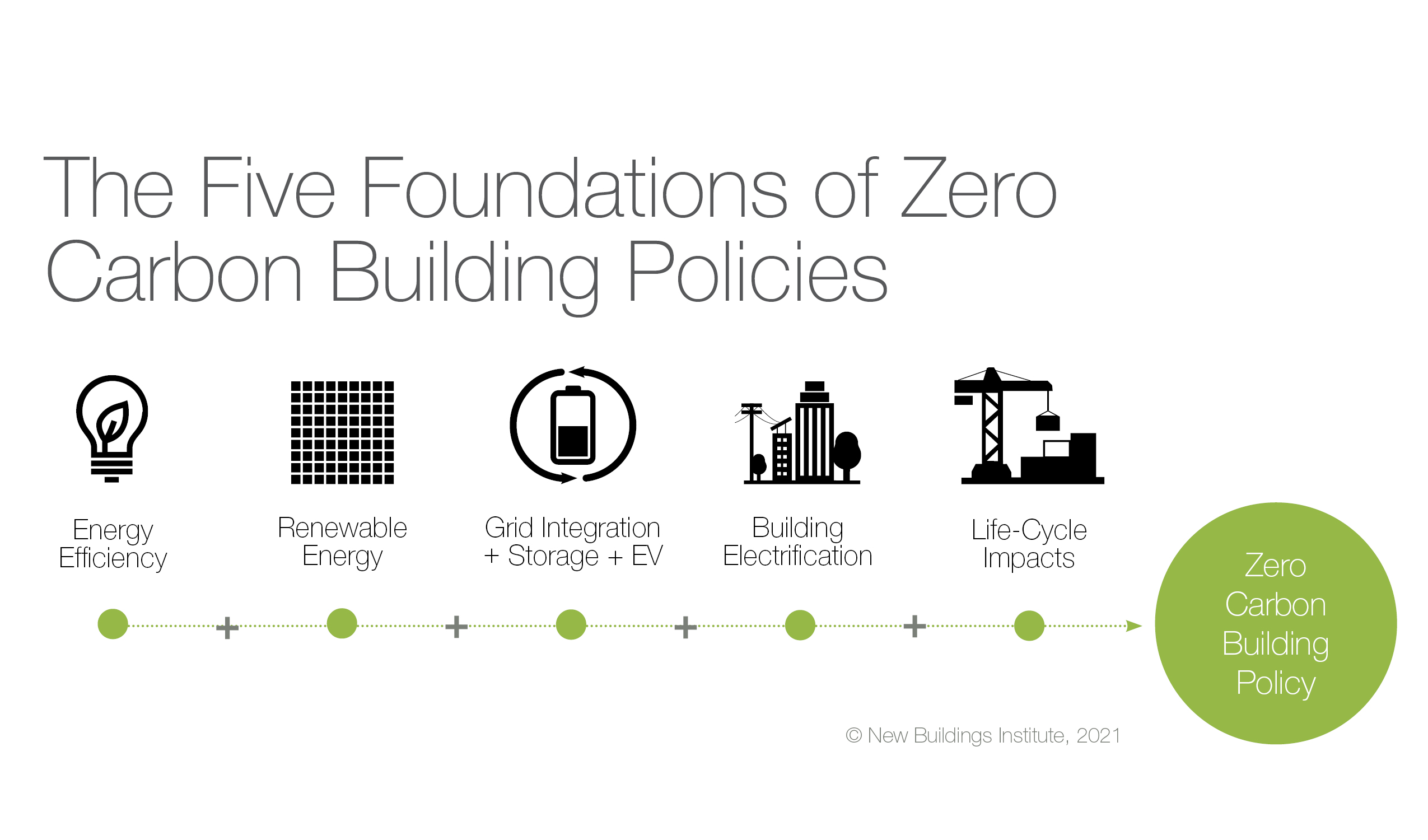The City and County of Denver recently released a comprehensive plan to achieve net zero energy (NZE) in new buildings and homes by 2030, one of many initiatives being taking to meet the jurisdiction’s goal of an 80% reduction in greenhouse gas (GHG) emissions by 2050. Denver’s buildings and homes are responsible for 64% of GHG emissions locally. By 2050, about 40% of Denver’s building stock will be “new,” having been built between 2020 and 2050, creating a huge opportunity for achieving energy and carbon reductions in the built environment. The strategies set out in the new Net Zero Energy New Buildings & Homes Implementation Plan (NZE Plan) will not only help the City and County reduce emissions from the building sector, but also lead to other positive outcomes, according to Amber Wood, Energy Program Administrator for the Denver Office of Climate Action, Sustainability, and Resiliency (OCASR).
“We see that climate change is one of the greatest challenges of our generation, and impacts people in multiple ways,” Wood said. “Net zero energy buildings are healthier, more comfortable, lower cost and are going to make Denver more attractive and competitive.”
Denver joins the Climate Challenge
In 2018, Denver became one of 25 cities selected to join the American Cities Climate Challenge, an initiative of Bloomberg Philanthropies to support mayors working to meet the goals of the Paris Climate Agreement. With cities being responsible for more than 70% of GHG emissions globally, and mayors having significant authority over high-emitting sectors (transportation and buildings), the Climate Challenge aims to accelerate their impact in those two areas.
Over the last two years, NBI assisted Denver with the development of its NZE Plan—once considered a “moonshot” goal, according to the American Cities Climate Challenge Climate Action Playbook, but now proven to be within reach for cities.
New Buildings Institute (NBI) is one of six organizations selected by Bloomberg Philanthropies to provide technical support to participating Climate Challenge cities in the area of building decarbonization. Over the last two years, NBI assisted Denver with the development of its NZE Plan—once considered a “moonshot” goal, according to the American Cities Climate Challenge Climate Action Playbook, but now proven to be within reach for cities.
Five Foundations for achieving NZE in buildings
Denver’s NZE Plan sets three specific goals to address the GHG emissions of new buildings:
- Net zero energy, all-electric new homes in the 2024 Building Code.
- Net zero energy, all-electric new buildings in the 2027 Building Code.
- New buildings perform as designed (performance verification) in the 2030 Building Code.
 Denver defines NZE as a new building or home that is:
Denver defines NZE as a new building or home that is:
- highly energy efficient,
- powered by renewable energy,
- a provider of demand flexibility for the grid, and
- all-electric.
These characteristics of a NZE building are aligned with the Five Foundations NBI has envisioned for policies that support low-carbon and carbon neutral buildings. Denver’s NZE Plan is organized around the first four of the Five Foundations for carbon neutral buildings, and it begins to address the fifth, embodied carbon.
Here’s how…
Energy Efficiency: Energy efficiency still offers many of the least-cost actions to achieve energy and carbon reductions in buildings. Denver’s NZE Plan begins with a focus on energy efficiency, which makes each of the other foundations easier to meet.
Renewable Energy Resources: Promoting zero carbon and zero carbon-ready buildings requires the decarbonization of the energy supply for buildings. Denver’s NZE Plan puts a focus on renewable energy for the whole building stock and sets goals for supplying low-carbon power to Denver buildings ahead of the decarbonization of the local utility grid through promoting both on-site and off-site renewables production.
Building-Grid Integration: When a building’s demand for electricity during a day, week or year differs from the time when energy is being supplied by onsite or grid-supplied renewable energy, it can create unaligned electricity demand load and generation curves. Denver’s NZE Plan includes policies to encourage building designs and load management that can help address the variable patterns of generation and consumption on the electrical grid.
Building Electrification: As the electricity grid decarbonizes and the emissions impacts of electricity usage shrink, the emissions impact of onsite combustion will remain, and the emissions benefits of building electrification will grow. Denver’s NZE Plan includes electrification policies that include future code requirements for electrification readiness and all-electric buildings in Denver.
Embodied Carbon: Building materials and construction accounts for 11% of global energy-related carbon emissions (UNEP 2017). As buildings increasingly target high-efficiency levels and low/zero carbon operations, the embodied carbon in the materials used to construct buildings constitutes a growing share of life cycle carbon impact.
Equity, health, and community Impacts
In Denver and other cities across the U.S., the COVID-19 crisis has crystallized the connection between environmental quality and public health. Energy costs have a disproportionate negative impact on lower income residents in Colorado, according to a 2018 study by the Colorado Energy Office. And, research shows the emissions of air pollutants from fossil fuel use in buildings and energy generation tends to disproportionality impact air quality and health outcomes for lower-income households.
Through a robust engagement process involving technical stakeholders as well as developers, general contractors, builders, architects, engineers, researchers, sustainability consultants, renewables, and utility experts, Denver sought input about the impacts of NZE building codes on its residents. From October 2019 to December 2019, Denver convened seven Net Zero Energy Stakeholder Advisory Group meetings. With assistance from Denver’s Office of Social Equity and Innovation, a Public Input Meeting about the NZE Plan attracted approximately 100 attendees. Equity and affordability were at the forefront of those discussions.
To address issues of affordability, the team looked at existing cost studies of energy-efficient, all-electric buildings including two specific to Denver. Research shows that by leveraging the cost savings of eliminating gas infrastructure and installing high-performance heat pumps, the new energy-efficient and all-electric construction will cost less to build and about the same to operate as a mixed-fuel building.
A key, often overlooked consideration from an equity standpoint is the potential for natural gas prices to rise over time as more and more buildings are electrified, leaving the cost burden of maintaining aging gas infrastructure on fewer and fewer customers. “Denver is looking for solutions that will electrify buildings and homes in our BIPOC communities first,” Wood says.
OCASR is currently working on a Beneficial Electrification Plan for existing buildings that will present solutions to “address the risk of low-income customers being the last on the system bearing the full weight of maintenance costs,” according to the NZE Plan.
What’s next for Denver?
Targets within the NZE Plan will be incorporated into the Denver Building and Fire Code through a formal code adoption process that will begin in Spring 2021. Meanwhile, the Energize Denver Task Force is convening stakeholders to deliberate similar and complimentary solutions to achieve NZE in existing buildings.
NBI is excited to support Denver and other cities in overcoming technical, affordability and other barriers to help ensure existing buildings can equally contribute to community’s achieving their climate and health goals.
Resources
Denver’s Net Zero Energy New Buildings & Homes Implementation Plan, January 2021
American Cities Climate Challenge Climate Action Playbook, October 2019
Denver’s Climate Action Task Force
Denver’s High Performance Buildings & Homes
For information about Denver’s NZE Plan or zero energy building codes in general, email [email protected]
by Sean Denniston, Senior Project Manager

